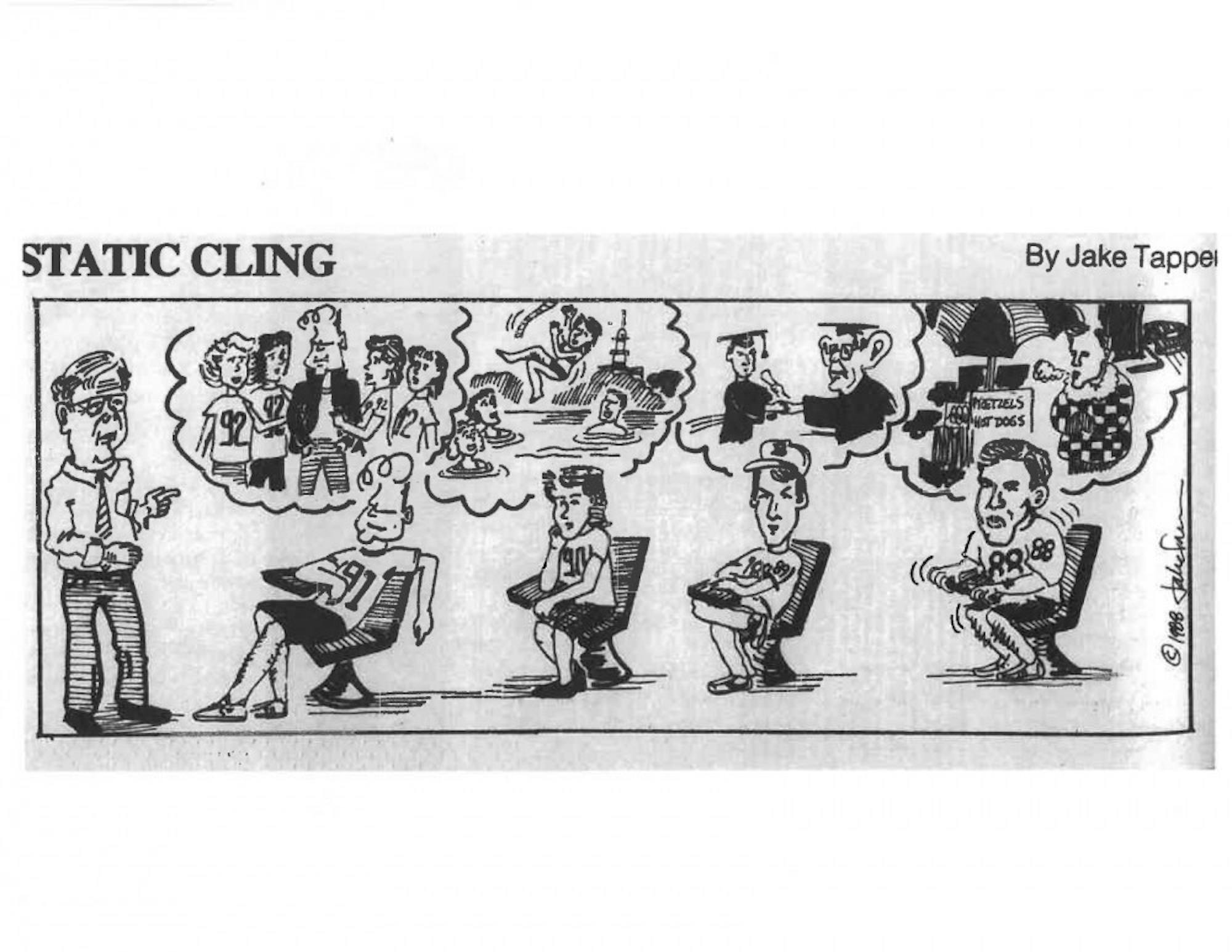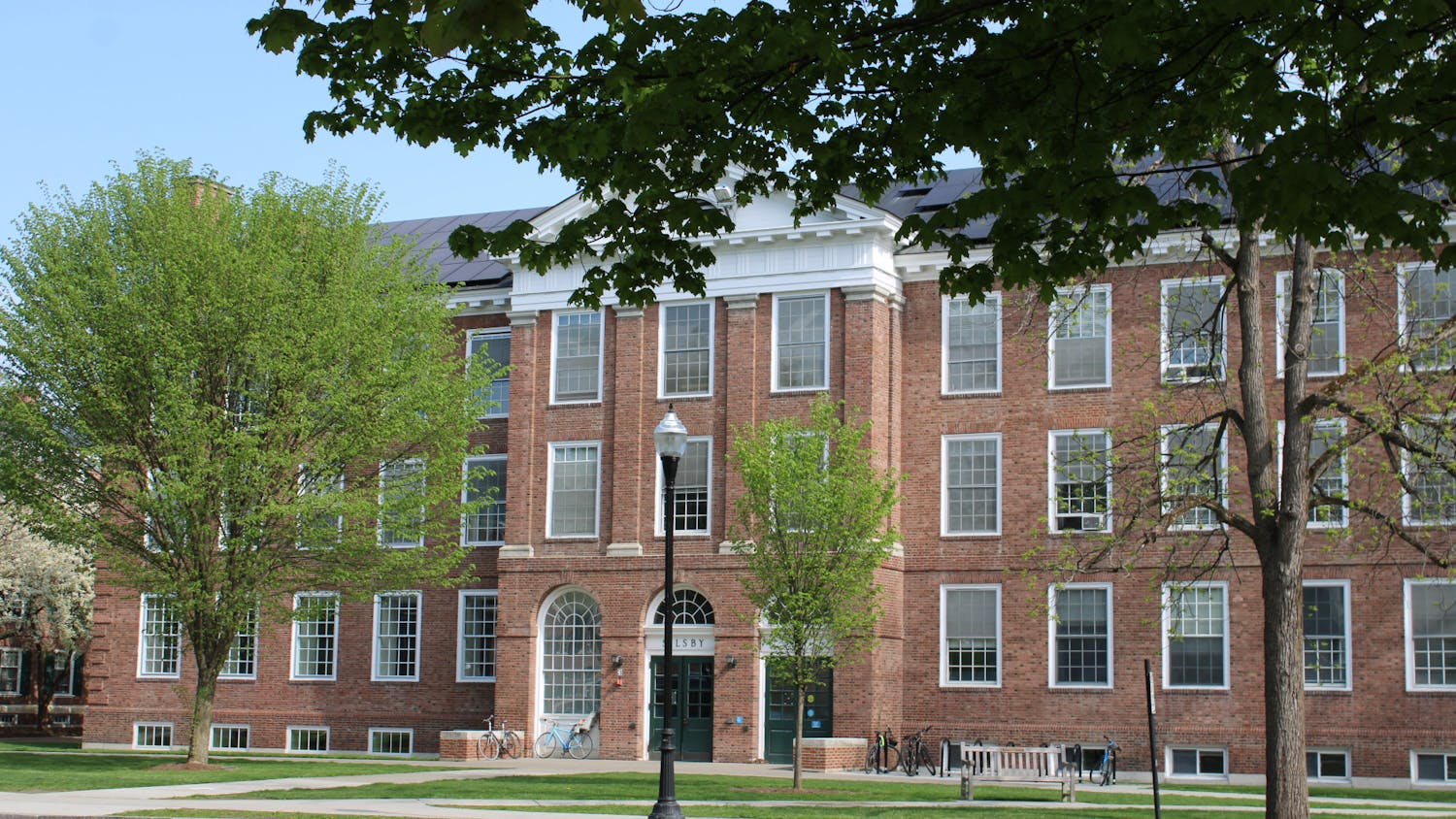This article is featured in the 2017 Commencement & Reunions Issue.
Jake Tapper ’91, the CNN journalist who will deliver this year’s Commencement address, recalled falling in love with Dartmouth when he visited campus for his father’s, Theodore Tapper Med’62, 25th reunion, in 1986.
Tapper said he was initially captivated by Dartmouth because of its small size and because he agreed with former U.S. President Dwight D. Eisenhower who said, upon visiting Dartmouth, that it was what a college campus should look like. Tapper also remembered that he liked that many people on campus were wearing Dartmouth apparel, which he said was different than other schools he visited and signified that people were proud to be at Dartmouth.
At Dartmouth, Tapper majored in history modified with visual studies. He was also a member of Alpha Chi Alpha fraternity until his junior year. He lived on the first floor of Cohen Hall his first year, in what he remembers as a small one room double.
“I lived in the smallest one room double, I think, in College history,” Tapper said.
When he learned that the room is still a one-room double, Tapper suggested that those students should be compensated for their undesirable living situation.
“That is a travesty,” Tapper said. “Those people should get a refund.”
Long before he was peppering Republican and Democratic politicians alike with questions — and with repeated follow-up questions — in his capacity as CNN news anchor and Chief Washington correspondent, as an undergraduate, Tapper commented life at Dartmouth through a series of comic strips called “Static Cling” he created for The Dartmouth.
He started drawing the comic strips during his freshman fall twice a week, and by his sophomore summer, Tapper was creating five strips a week. Tapper said that created his strips based on “where the jokes were,” drawing inspiration from topics including professors, fraternities and himself. Tapper said that the comic strip was a “huge” part of his college career.
Tapper noted that he felt that he had complete free speech rights while creating his strips, which he believes is representative of Dartmouth in general.
“It seems to me that Dartmouth is a place where free speech has always been so valued and honored,” Tapper said, “So it was great that no matter how many College professors I made fun of, or how many College deans I depicted as superhero villains, no one ever questioned a line that I drew or a word that I wrote — I just had complete free speech.”
David Hillman ’91, one of Tapper’s close friends at Dartmouth, said that “Static Cling” made Tapper a campus figure. Hillman said that everyone read the strip and that it was enjoyable.
“[‘Static Cling’] was controversial, it was funny and it was always exciting when a new one would come out,” Hillman said.
Even James Wright, who was then Tapper’s freshman History 2 professor and who would go on to become president of the College, took notice.
Wright recalled one installment that depicts a professor teaching a class in which students are daydreaming. Wright said he recognized himself as the professor in the cartoon.
In class the day the cartoon came out, Wright mentioned the cartoon to Tapper, and Tapper became visibly uncomfortable.
“I said, ‘Interesting cartoon today, Jake,’” Wright recalled. “And he actually got a little flustered, which he doesn’t do very often, because I suspect he didn’t know that I actually looked at the cartoons in The D and that I recognized that I was the model.”
Wright said that Tapper told him that the satire was directed at the students, rather than at Wright. Wright said he did not take offense when he saw the cartoon then and does not take offense at it now.
Tapper spent most of his time at Dartmouth with Hillman and eight other men who all lived in the Choates Cluster their freshman year.
Hillman, who lived in Bissell Hall, recalled that the group would use the lounge between Bissell and Cohen to play five versus five puff basketball, a game which he said Tapper played frequently and well.
“[Tapper] was always a participant and was really a puff basketball all-star,” Hillman said.
When reflecting on what he remembered about Tapper while a Dartmouth student, Hillman commented that Tapper was fearless.
“The thing about [Tapper] was that he was somewhat unafraid, which is a little different than most people,” Hillman said, “Most people go to college, they want to learn, they want to have a good time, but Jake was unafraid early on in his college career, and so that was fun and exciting to be friends with someone like that.”
The CNN anchor, who hosts the CNN weekday news show “The Lead with Jake Tapper” and the CNN Sunday morning public affairs show “State of the Union,” grew up in Philadelphia, Pennsylvania. His parents, Theodore and Anne Tapper, divorced when he was eight years old. He split his childhood between his mother’s home in urban Philadelphia and his father’s in suburban Philadelphia. Tapper has one younger brother and three step-sisters.
Tapper said journalism piqued his interest as a child. At 5 or 6 years old, he said, he created and distributed a neighborhood newspaper to a few houses in his neighborhood. In high school, Tapper wrote for and edited his high school newspaper.
After Dartmouth, Tapper said he expected to become a professional cartoonist. He attended the University of Southern California School of Cinematic Arts, but soon realized he was not as enamored with the film industry as he expected and eventually rediscovered his passion for journalism.
Tapper said journalism appealed to him because he was “a political junkie” and that he could have “the opportunity to speak truth to power, the opportunity to tell stories that I didn’t think other journalists were telling.”
Tapper said he still considers journalism essential, especially after covering the 2016 presidential campaign for CNN.
“Journalism is more vital than ever before, and journalism needs to be non-ideological, non-partisan, stand up for basic American principles, such as the importance of truth and the importance of basic decency,” Tapper said, “And in terms of lessons from 2016, too many people in the media lean too heavily on polls without looking at the margin of error in those polls. Questioning our own experts and questioning authority should also extend to people in the media.”
Wright has followed Tapper’s work and watches Tapper’s shows, noting that Tapper is a strong journalist because he is willing to ask questions to determine the answer.
“He really will press a question trying to get an answer, and that’s what a good journalist has to do,” Wright said.
Nine out of the 10 members of Tapper and Hillman’s Dartmouth friend group are returning to Dartmouth for Commencement this year.
Hillman said he is looking forward to Tapper’s Commencement address. He stated that he thinks Tapper’s address will be memorable because he is “down to earth” and relatable, since he is an alumnus.
Tapper said that his address will focused on giving the graduating class advice as they enter a new phase of their lives.
“I am going to be giving the best advice that I can give to the Class of 2017, and that the speech is not about me and what I think is important for my life right now,” Tapper said. “It’s a speech about members of the Class of 2017 and what I wish I knew when I was sitting there in a cap and gown in 1991.”
Hillman said that Tapper’s address should be brief.
“Don’t make it too long,” Hillman joked. “No one likes a long speech.”
Alexandra is a ’20 from New York and is unsure of what she plans to study, but has interests in neuroscience, geography, and human-centered design. Alexandra has written for The D since her freshman fall, and she enjoys meeting people and learning about various groups on campus through her articles.




